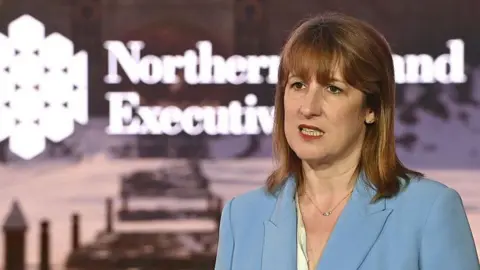UK borrowing costs hit 27-year high adding to pressure on Reeves
16 minutes agoTom EspinerBusiness reporter, BBC News

 Getty Images
Getty ImagesLong-term government borrowing costs in the UK reached their highest level since 1998 on Tuesday, adding to the pressure on the chancellor ahead of the Budget.
The interest rate on 30-year government bonds, known as the yield, jumped to 5.698%, its highest level for 27 years, as worries grew about the state of the government’s finances.
There are rising expectations that Chancellor Rachel Reeves will increase taxes in the Budget later this year in order to meet her financial rules.
On the currency markets, the pound also fell more than 1% against the dollar on Tuesday morning.
Governments borrow money from investors by selling them bonds – which is a loan the government promises to pay back at the end of an agreed time.
The yield on 30-year UK government bonds – known as gilts – has been rising for some months, and this makes it more expensive for the government to borrow money due to higher interest payments.
The government’s official forecaster, the Office for Budget Responsibility (OBR), takes borrowing costs into account when looking at whether the chancellor is meeting her self-imposed fiscal rules.
Government borrowing, bonds and yields explained
When she became chancellor, Reeves set out two rules on government borrowing. These were:
- day-to-day government costs will be paid for by tax income, rather than borrowing by 2029-30
- to get debt falling as a share of national income by the end of this parliament in 2029-30
Part of the reason Reeves is under pressure is that her financial buffer to stick to these rules is a relatively slim £10bn.
Susannah Streeter, head of money and markets, Hargreaves Lansdown, said: “The UK Chancellor is facing highly difficult choices in the upcoming Budget, and she’s been dealt a warning by gilt investors.
“They are selling off UK government debt, clearly concerned that the government may be losing its grip on the public finances.”
There has already been much speculation over what taxes Reeves could raise in the autumn Budget.
One option suggested is that the freeze on income tax thresholds, which is due to end in 2028, could be extended. The freeze means that, over time, more people are dragged into paying higher tax rates.
There have also been reports that Reeves is considering reforming property taxes.
“With so many options for raising taxes being bandied about during the summer, there appears to be concern that the decisions made might not be sufficiently thought through,” said Ms Streeter.
“The worry isn’t just that government coffers won’t be replenished, but that they will be filled at the expense of growth, leading to a vicious circle emerging.”